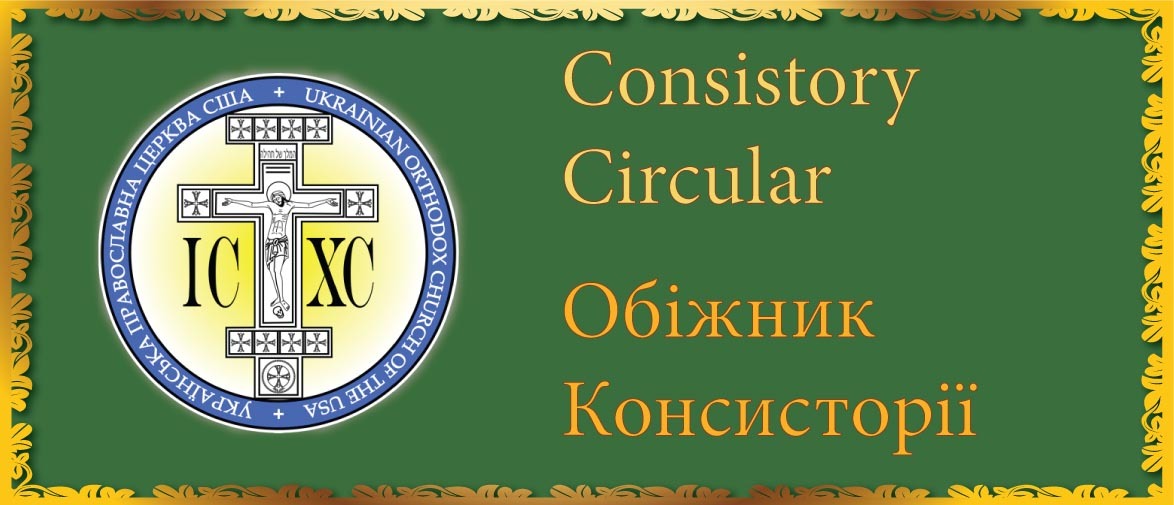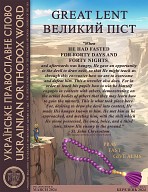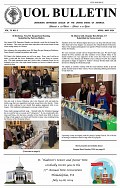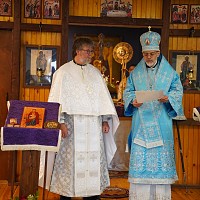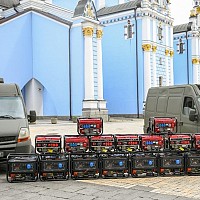The Holy Gospel According to St. Mark
Chapter 15
42 When it was already evening, since it was the day of preparation, the day before the sabbath, 43 Joseph of Arimathea, a distinguished member of the council, who was himself awaiting the kingdom of God, came and courageously went to Pilate and asked for the body of Jesus. 44 Pilate was amazed that he was already dead. He summoned the centurion and asked him if Jesus had already died. 45 And when he learned of it from the centurion, he gave the body to Joseph. 46 Having bought a linen cloth, he took him down, wrapped him in the linen cloth and laid him in a tomb that had been hewn out of the rock. Then he rolled a stone against the entrance to the tomb. 47 Mary Magdalene and Mary the mother of Joses watched where he was laid.
Chapter 16
1 When the sabbath was over, Mary Magdalene, Mary, the mother of James, and Salome bought spices so that they might go and anoint him. 2 Very early when the sun had risen, on the first day of the week, they came to the tomb. 3 They were saying to one another, "Who will roll back the stone for us from the entrance to the tomb?" 4 When they looked up, they saw that the stone had been rolled back; it was very large. 5 On entering the tomb they saw a young man sitting on the right side, clothed in a white robe, and they were utterly amazed. 6 He said to them, "Do not be amazed! You seek Jesus of Nazareth, the crucified. He has been raised; he is not here. Behold the place where they laid him. 7 But go and tell his disciples and Peter, 'He is going before you to Galilee; there you will see him, as he told you.'" 8 Then they went out and fled from the tomb, seized with trembling and bewilderment. They said nothing to anyone, for they were afraid.
- - -
In the Name of the Father and of the Son and of the Holy Spirit. Amen.
CHRIST IS RISEN! ХРИСТОС ВОСКРЕС! CHRIST IS RISEN!
With even just a cursory glance through the Church calendar, we notice that of the many, many names listed – often very unusual by today’s standards – the overwhelming majority belong to men. We speak always of the Fathers of the Church, honoring their memories and cherishing their teachings. We know our Holy Orthodox Church is governed by her Patriarchs and other bishops; men chosen by the Holy Spirit in succession of the men chosen by our Lord Himself to be his Apostles. We know, for valid theological reasons, our priests can only be men. Yes, we can convincingly argue the point that the Church is “a man’s world.” Yet today, this third Sunday of Pascha, as we continue celebrating the event that changes history and all creation, the Holy Church asks us to turn our thoughts to the Holy Myrrhbearers: Saints Mary Magdalene, Joanna, Salome ( a daughter of Joseph according to some ancient sources), Mary (Joseph’s sister according to some ancient sources) the wife of Cleopas, Susanna, Mary and Martha of Bethany, and the Most-Holy Birth-Giver of God – all … WOMEN!
In truth, for us living today in 21st - century America, it is hard to relate to the very different role women had in 1st - century Palestine. The woman’s place was truly in the home – subordinate and obedient to her husband in all things; consigned to an existence of cooking, raising children, making clothing and a host of other never-ending domestic duties. Official Judaism accepted this as the Divine Law; the mandated order that dare not be overturned.
From reading the Gospels, we know that one of the charges consistently leveled against our Lord by the Scribes and Pharisees was that he was attempting to “change the Law”, to “subvert the traditions of our ancestors”. We know of course, that this was not the case; He Himself explained, “I came not to abolish the Law, but to fulfill it” As the Lawgiver, he came to give a more perfect and complete understanding of the Law that had been possibly previously. This included revealing a much more exalted role for women. We know that although He did not choose women to be among the Twelve, many women were among his followers, and as St. Luke tells us, “they supported Him out of their means.” Even at the time of His crucifixion, when the “manly” disciples had fled out of selfish fear – except for John – the faithful women kept vigil.
Despite the cultural limitations and inhibitions they had absorbed over the years, these faithful women still felt the need to act – to do something, even if just one last gesture, to manifest their love for Jesus, Who took the time not to look at them just as second class citizens, but as persons created in the image and likeness of God. They saw the place when Saints Joseph of Arimathea and Nikodemos hastily entombed the Lord because of the impending Sabbath sunset, and knew what they had to do.
Obedient to the observance of the Sabbath, the women waited until the following sunrise after the Sabbath to put their plan into action. They were going to do something expensive, something dangerous, something maybe even foolish in the eyes of others, but they knew it was the right thing to do.
The Holy Myrrhbearers were - no offense, ladies - ordinary peasant housewives. With the exception of St. Joanna, who was the wife of Herod’s steward Chuza, none of them were wealthy. Yet the Evangelists tell us they purchased large amounts of costly myrrh, ointments and perfumes with which to anoint the body of the Lord. They sacrificed the little they had saved up for their own families for ‘a rainy day’ because they realized they could not put a value on God’s love. His presence in their lives had been priceless and they were not going to skimp now. They spared no expense. But they were not worried about the expense.
The Holy Myrrhbearers literally put their lives at risk to accomplish their goal. Cities in the ancient world were walled for good reason – the territory outside the walls was a no-man’s land domain of wild animals and brigands, especially after dark. Since our Savior’s tomb was in the garden near Golgotha, it was beyond the safety of the city walls. The women deliberately and knowingly stepped out into this vulnerability in order to express their love. Even more, assuming they made it safely to the tomb, the Roman guards would certainly have used any force necessary to prevent them from accessing the tomb. But they were not worried about the danger.
The Holy Myrrhbearers no doubt heard voices as they left their homes in that dark early morning stillness: “You’re going WHERE?”… “To do WHAT?” … “Are you CRAZY?”… “How do you WOMEN think you are going to move that huge stone?” ... “You better be back here in time to get my breakfast ready!” Certainly, their plan to go and anoint the body of the Lord, by most people’s evaluation, was not realistic. How would they get to Him? As the expression goes, “The devil is in the details.” They were not concerned with other people’s perception of them. Yes, maybe it wasn’t practical; maybe it was positively foolish. But they were not worried about looking foolish.
And so what happened? This small band of the “weaker sex”, these frail women, were the first to hear the words that will resound throughout the universe as long as it exists: CHRIST IS RISEN! Not Andrew, who was the first called to discipleship; not Peter, who swore he would never deny the Lord; not James and John who vowed willingness to drink of the same cup He would – no, they had locked themselves away, paralyzed by fear into inactivity. Because the Holy Myrrhbearers, in faith, blinded themselves to everything except their desire to show their love for Christ, they were vouchsafed this unique and blessed experience.
There is a powerful lesson here for all of us. All of us profess our faith in Christ, yet is it the fearless, trusting, unhesitating faith of the Holy Myrrhbearers? Too often, despite our initial good intentions, we allow ourselves to be dissuaded from expressing or acting out our faith. We fear the COST of living as Christians, whether in actual financial terms, or in terms of the time and energy or emotion it takes to offer ourselves to others out of love for Christ. We fear the DANGER of living as Christians – it always seems so much easier to maintain the status quo, so much safer to keep doing the same old things the same old ways, even if it means passing up the opportunities to make Christ manifest in our little corner of the world. We fear looking FOOLISH by living as Christians, in a world that holds values and priorities that too often are very different from the Gospel.
The Holy Myrrhbearers did not compile any Gospels, they left us no Epistles; as far a we know, none of them died as martyrs. It would see, in some cases, they faded back into history after that first Pascha morning, yet they remain unforgettable heroes of the Faith because of the powerful witness of their actions. Through their prayers, may we too have the courage to actively love Christ first, and then worry about the details later.
In the Name of the Father and of the Son and of the Holy Spirit. Amen.
CHRIST IS RISEN! ХРИСТОС ВОСКРЕС! CHRIST IS RISEN!
Fr. Michael Kochis



